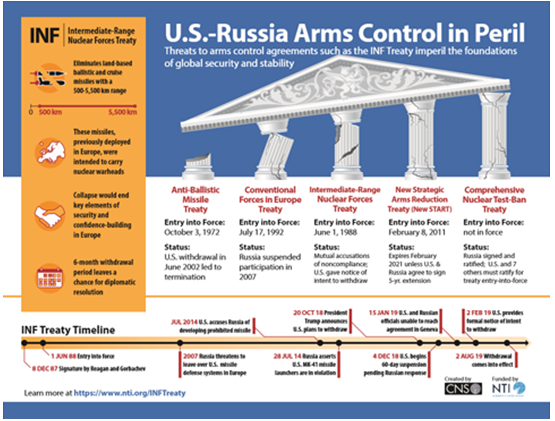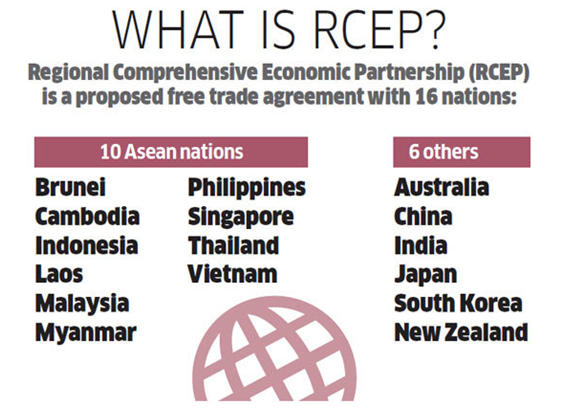U.S. formally withdraws from INF arms treaty
International
- The U.S. and Russia terminated a Cold War-era missile pact in a move that raised the spectre of an arms race between the global superpowers.
- The 1987 Intermediate-Range Nuclear Forces (INF) treaty limited the use of medium-range missiles, both conventional and nuclear.

Elected directors in PSBs will be appointed by board: RBI
Economy

- The Reserve Bank of India (RBI) has mandated that the elected directors of public sector banks (PSBs) are to be appointed by the nomination and remuneration committee of the board of the respective banks.
- The RBI has come out with guidelines on ‘fit and proper’ criteria of elected directors in PSBs and said all these banks were required to constitute a nomination and remuneration committee consisting of a minimum of three non-executive directors from the board, out of which not less than one-half will be independent directors and should include at least one member from the risk management committee of the board.
- The non-executive chairperson of the bank may be appointed as a member of the committee but shall not chair such a committee.
- An elected director can be appointed for three years and could be re-elected but cannot hold office for than six years. “
- The candidate should not be holding the position of a Member of Parliament or State Legislature or municipal corporation or municipality or other local bodies.
- Candidates engaged in stock broking, or a member of any other board of a bank or financial institution, connected with hire purchase, financing, money lending, investment, leasing and other para banking activities cannot be considered for the appointment.
- The candidate should not be acting as a partner of a chartered accountant’s firm which is currently engaged as a statutory central auditor of any nationalised bank or the State Bank of India.
NPR data to be collected in a year
Governance
- The next round of recording biometric and family-tree details of Indian citizens under the National Population Register (NPR) will be conducted in September 2020.
- The exercise is different from the decennial Census and is not linked to the National Register of Citizens (NRC).
- The objective of the NPR is to create a comprehensive identity database of every usual resident in the country.
- The database would contain demographic as well as biometric particulars.
- The exercise was conducted earlier in two phases in 2010 and 2015.
- For the purpose of the NPR, a usual resident is defined as a person who has resided in a local area for six months or more or a person who intends to reside in that area for the next six months or more.
- Earlier, the roll out of NPR had slowed down due to overlapping with that of Aadhaar.

RCEP must fix trade deficit
International
- India has told China that the proposed mega free trade agreement RCEP should address the causes of high trade imbalances among the member countries.
- Covering 47.4% of the global population, 32.2% of the global economy, 29.1% of global trade, and 32.5% of global investment flows in 2018, RCEP is the most important trade agenda in the region, supportive of an open, inclusive, and rules-based trading system, and an enabling trade and investment environment.
- The RCEP bloc comprises 10 ASEAN group members (Brunei, Cambodia, Indonesia, Malaysia, Myanmar, Singapore, Thailand, the Philippines, Laos and Vietnam), and their trade partners India, China, Japan, South Korea, Australia and New Zealand.
- India registered a trade deficit in 2018-19 with 11 RCEP member countries of the 16 nations that have been negotiating a mega trade pact since November 2012. In 2018-19, India’s trade deficit with China stood at $50.2 billion.
- India has sought greater market access from China for its products like sugar, rice and pharmaceuticals to narrow the high trade deficit.

Canine Distemper Virus
Ecology

- The Prime Minister’s announcement that tiger numbers have increased in the country may be good news.
- But the loss of habitat, a decline of prey and poaching continues to be a threat to tigers’ survival.
- Along with these, a potential virus — Canine Distemper Virus (CDV) — that can be transmitted from CDV-infected dogs living in and around wildlife sanctuaries has started to raise concern among wildlife biologists.
- Canine distemper is a contagious and serious disease caused by a virus that attacks the respiratory, gastrointestinal and nervous systems of puppies and dogs.
- 86% of the tested dogs around Ranthambhore National Park in Rajasthan carried CDV antibodies in their bloodstream. This means that the dogs are either currently infected or have been infected sometime in their life and have overcome the disease.
- This finding points out that there is an increased risk of disease transfer from the dogs to tigers and leopards that live in the park.
- Last year, over 20 lions from the Gir forest succumbed to the viral infection and now a guideline has been prepared by the National Tiger Conservation Authority to prevent the spillover of the disease to wild animals.





